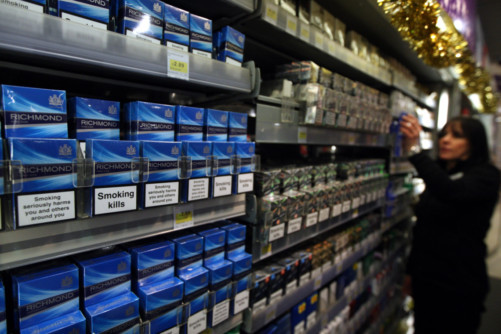DISPLAYING CIGARETTES is to be banned in Scotland after one of the world’s biggest tobacco firms lost a Supreme Court fight.
The UK’s highest court dismissed an appeal by Imperial Tobacco against the Scottish Government’s attempts to ban tobacco vending machines and the open display of cigarettes in shops.
The legal challenge centred on whether or not the matter was a devolved issue but was unanimously thrown out at the final stage yesterday.
A previous appeal by the tobacco giant was dismissed at the Court of Session in Edinburgh earlier this year and the way has now been paved for the bans to be put in place next spring.
Minister for Public Health, Michael Matheson, welcomed the ruling and said the Scottish Government would be looking to recover the legal fees incurred to the taxpayer as a result of the court case.
He said: “Given that this legislation was passed over two years ago and is already in force in England, Wales and Northern Ireland, there are strong arguments to introduce it immediately.
“However, I have always been clear on the need to allow retailers sufficient time to make the necessary changes.
“So we have decided that April 2013 represents a fair timescale for implementing the display ban.
“The introduction of the ban on vending machines will be in line with our commitment to provide a four-month implementation period.”
At a hearing in London, lawyers representing Bristol-based Imperial asked a panel of five Supreme Court justices to analyse the issues after twice failing to persuade Scottish judges to set aside legislative provisions.
Ministers say display bans are needed to protect future generations from the “devastating effects” of smoking.
Imperial, the firm behind Lambert & Butler and Richmond cigarette brands, argues there is no credible evidence display bans have cut tobacco consumption.
Imperial argued sections 1 and 9 of the Tobacco and Primary Medical Services (Scotland) Act 2010 were “outside the legislative competence of the Scottish Parliament”, which was unanimously dismissed.
Section 1 prohibits the display of tobacco products in a place where they are offered for sale and section 9 prohibits vending machines for the sale of tobacco products.
A spokesman for the company said: “Naturally, we are disappointed with the judgement as we believe our legal argument was strong.
“We will now await the publication of Scotland’s display ban regulation and consider our options.”
Announcing the decision of the court, Lord Hope said: “Sections 1 and 9 are designed to promote public health by reducing the attractiveness and availability of tobacco products, not to prohibit in any way their sale to those who wish and are old enough to purchase them.”
Sheila Duffy, chief executive of ASH Scotland, welcomed the ruling as a way of making sure young people don’t feel pressured or tempted to take up smoking.
“Scottish Ministers should be congratulated for facing down these bullying tactics from the tobacco industry and for producing stronger restrictions on tobacco displays than elsewhere in the UK.”
kiandrews@thecourier.co.uk
